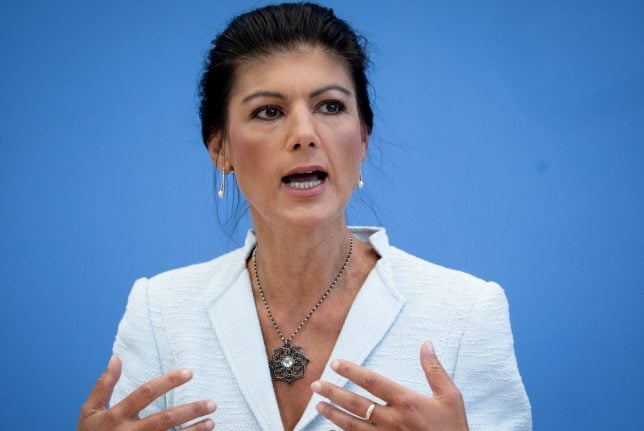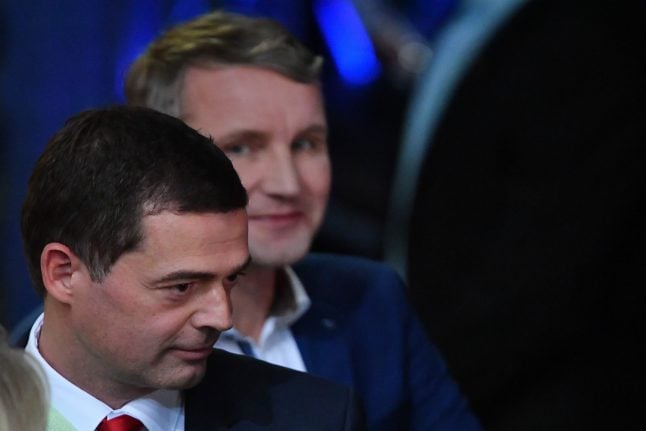Sahra Wagenknecht, a divisive Socialist leader of the far-left Die Linke party, and other co-founders presented the 'Stand Up' (Aufstehen) alliance a week after extremist mobs in east Germany attacked foreigners and noisily protested against Chancellor Angela Merkel's immigration policies.
Wagenknecht, 49, deplored the neo-Nazis making Hitler salutes and the ugly outbursts of racist hatred, but argued that many citizens had followed the call of the far-right Pegida movement and anti-immigration AfD party out of frustration over their social conditions.
“I am sick of abandoning the streets to Pegida and the far right,” she told a Berlin press conference, launching the cross-party populist movement which she said had won more than 100,000 followers since its online debut several weeks ago.
“Many people joined not because they hate foreigners but because they feel left behind,” she said about the rallies in Chemnitz in the formerly communist East, a region which still lags the west economically almost 30 years after reunification.
Populist campaign
The new leftist movement has been compared to the populist campaigns of US Senator Bernie Sanders and Britain's Labour leader Jeremy Corbyn, but also to left-wing social movements in Spain and Italy.
It is the brainchild of Wagenknecht and her husband Oskar Lafontaine, 74, a firebrand socialist, ex-finance minister and defector from the centre-left Social Democrats (SPD).
As 'Stand up' is, at least initially, a movement rather than a registered political party, anyone can join – the main target groups being disenchanted followers of the SPD and Greens.
The movement's declared goal is to counter the “neoliberal policies” of Merkel's centrist coalition government and fight for secure jobs and pensions, environmental protection and “a true democracy not ruled by banks, corporations and lobbyists”.
Its website declares boldly that “no politician, no party will solve our problems if we don't do it ourselves”.
Unsurprisingly, the leaders of the three leftist parties all reject the plan, arguing it further divides and weakens them. Linke chairman Bernd Riexinger attacked Wagenknecht for splitting her own party.
No 'open borders'
Wagenknecht, who hails from the former communist East, is a polarizing TV talk show regular, but sometimes awkward with voters. She has courted controversy by criticizing the European Union and defending Vladimir Putin's Russia.
She has also broken with the left's “open borders” orthodoxy on immigration by arguing that “economic immigrants” take jobs from low-income Germans and strain public services.
However, unlike the anti-Islam AfD, she defends Germany's asylum law for those escaping war, persecution and human rights abuses in their homeland.
The idea of a German cross-party leftist alliance has repeatedly come up and been dismissed – in large part because of Die Linke's uncompromising hard-left positions, such as wanting to abolish NATO.
In last year's elections, which saw the shock entry of the AfD into the Bundestag, combined support for the left parties dropped below 40 percent.
The dispirited SPD reluctantly joined Merkel's conservatives again as junior coalition partner, further damaging morale.
Among the co-founders of 'Stand Up' was the SPD's Simone Lange, who this year ran as a relative unknown for the party's leadership and scored a surprise 27 percent, seen as an expression of discontent within the party.
Wagenknecht said she was impressed with initial support for “Stand Up” and declared herself open to hand over to other leaders in future if it proves a success.
A voter poll conducted by the Civey institute for news portal t-online found that 62 percent of respondents do not believe the movement has a long-term future.



 Please whitelist us to continue reading.
Please whitelist us to continue reading.
Member comments